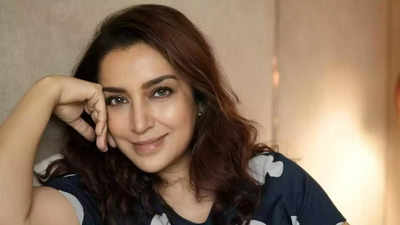- News
- entertainment
- hindi
- bollywood
- Tisca Chopra: 'Manish Malhotra didn’t see me as a woman or a man, he saw me as a storyteller' - Exclusive
Trending
Tisca Chopra: 'Manish Malhotra didn’t see me as a woman or a man, he saw me as a storyteller' - Exclusive
Tisca Chopra has carved a niche for herself in both mainstream and independent cinema. She has now taken on a new challenge behind the camera with her directorial debut, Saali Mohabbat, produced by ace designer Manish Malhotra. In an exclusive conversation with ETimes, Tisca opened up about her journey from actor to director, working with Anurag Kashyap, addressing gender bias in Bollywood, and more.

In an exclusive conversation with ETimes, Tisca, who attended the IFFI for the gala premiere of Saali Mohabbat, opened up about her journey from actor to director, working with Anurag Kashyap, addressing gender bias in Bollywood, and more.
Tell me about making a directorial debut. Was it always a dream, or how did it come about that you wanted to become a director?
Honestly, dreams evolve. We come with a dream, and that dream keeps changing and transforming. It's not just a dream because, at some point, it does come true. Along the way, I fell in love with stories. Initially, one comes into this industry to be famous, to act, to explore different avenues, and then that happens. But over time, I found myself getting more and more drawn to stories.
Manish (Malhotra) heard one of my narrations, and within three minutes, he said yes.
Was he the first person you reached out to?
No, not at all. We took the film to several places. Unfortunately, COVID happened, and things got delayed. At one point, Anurag was supposed to produce it, but he was dealing with some personal and professional challenges, so the project came back to me.
Someone suggested I approach Manish, and I remembered how we had worked together years ago. He had designed costumes for my very first film as an actor. I still have photos of the orange and black dress he made. We’ve stayed in touch over the years, and when I narrated the story to him, he loved it. That’s how the collaboration began.
What was the theme of the film?
Without revealing too much, it’s about love and how it can take you to strange places, sometimes even dead ends. It’s about the complexity of love, the pain it can cause, and how it governs our lives.
EXCLUSIVE: Divyenndu Sharma's 'Happy Crazy' Reaction As 'Munna Bhaiya' Returns To 'Mirzapur' | WATCH
As a director, did the actor in you ever interfere?
Initially, yes. I made the mistake of trying to show the actors how to perform a scene. But I quickly realized it was unnecessary, especially since I was working with such talented actors. I had to trust them and let them do their jobs, which they did beautifully.
You’ve been in the industry for years. As a woman, do you feel the gender factor still exists?
Gender bias exists if you perceive it and let it dominate your mind. I’ve been fortunate to attract people who resonate with my energy and vision. For instance, Manish didn’t see me as a woman or a man, he saw me as a storyteller. That’s the mindset I’ve encountered.
However, I acknowledge that challenges exist in certain areas. For example, I often discuss this with Priya Seth, a cinematographer, who faces struggles securing projects despite her immense talent.
How did it feel on the first day of directing?
Oh, it was nerve-wracking! My first day was spent directing Anurag Kashyap. Can you imagine? He’s such a big name. He was pulling my leg the entire time, saying, “Director hai ab tum.” But it was all in good humor, and we had a great time working together.
What’s next for you?
We’ve already written Saali Mohabbat 2. The first film was always meant to have an open ending, lending itself to a sequel.
And the actors?
Working with Radhika Apte, Divyenndu, Anshuman Pushkar, Anurag Kashyap, and others was an absolute blessing. Their natural talent is inspiring. Watching them perform was a masterclass in itself. I’m sure directing has made me a better actor, and acting has enhanced my understanding of direction.
End of Article
FOLLOW US ON SOCIAL MEDIA









